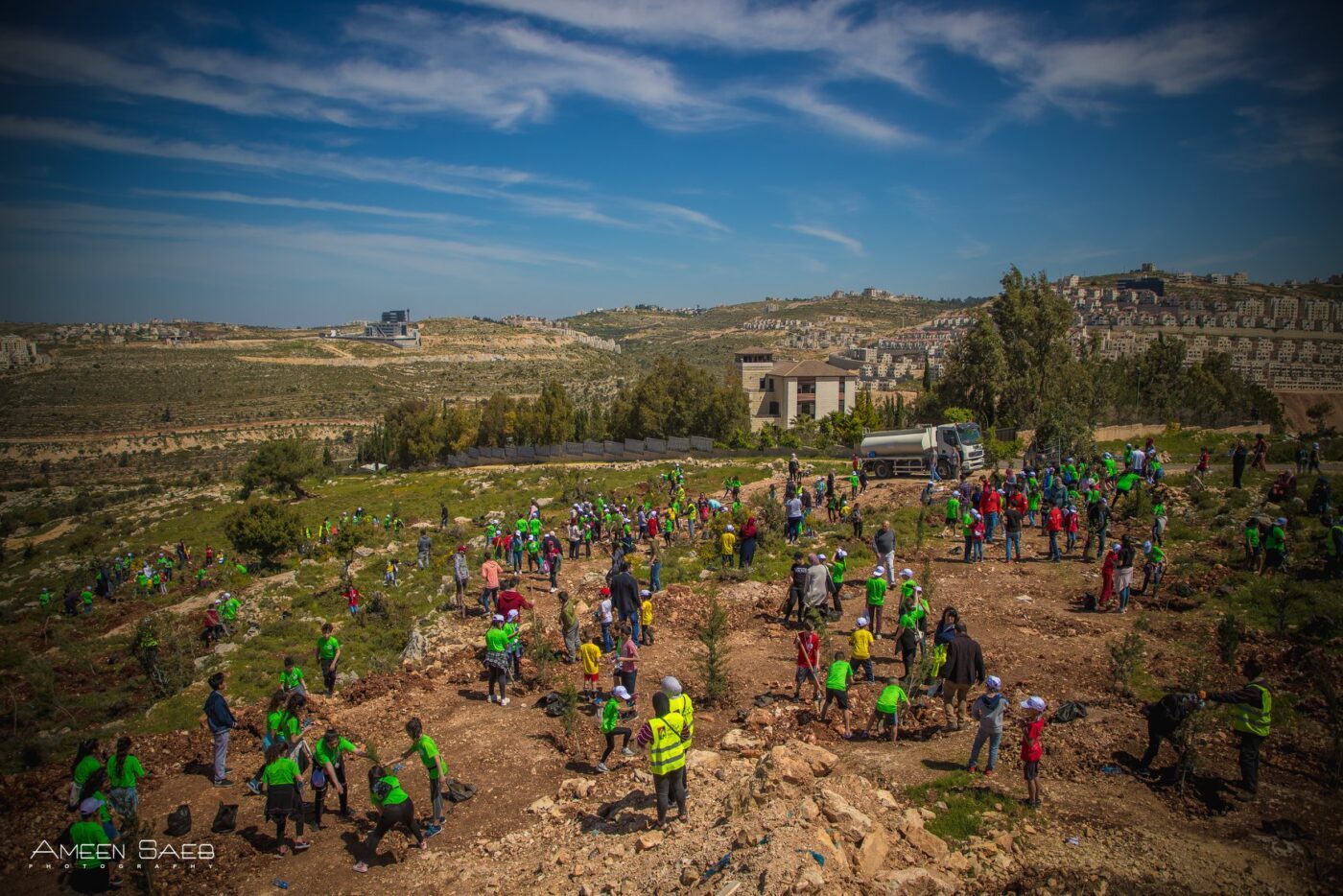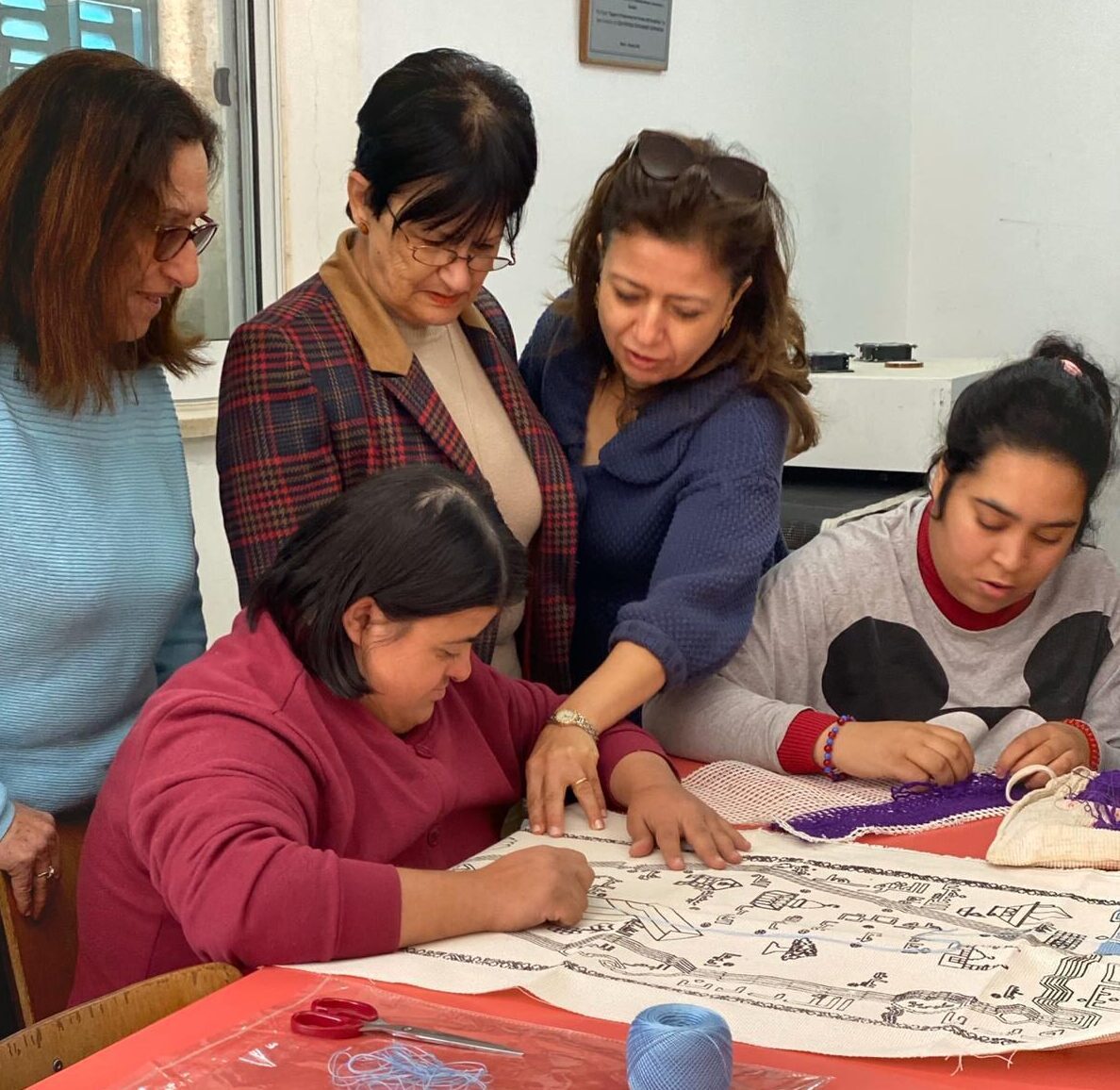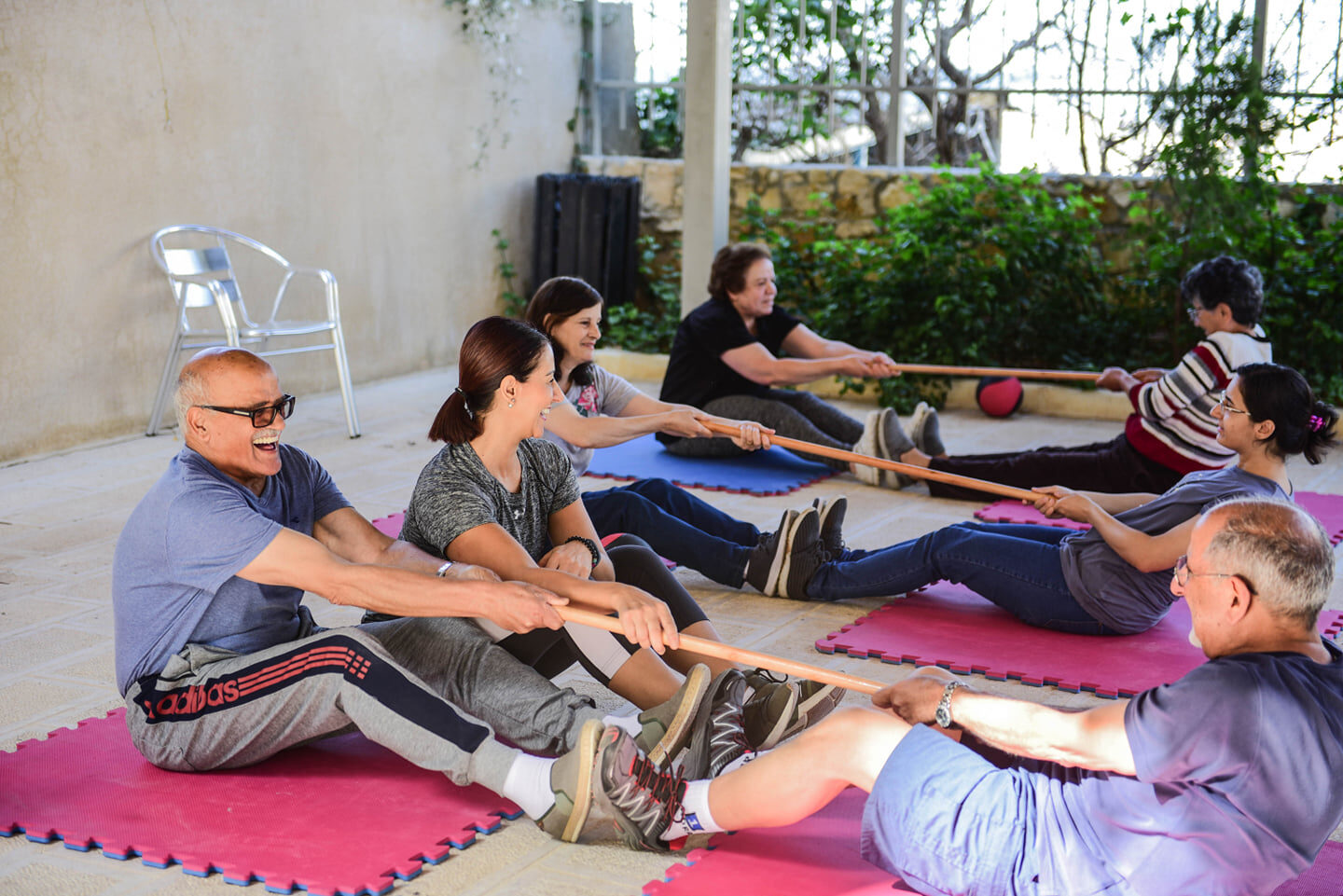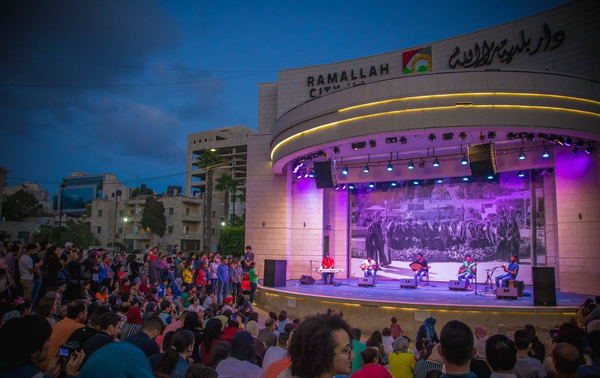 part of planting activity engaging seniors and young volunteers - © Ramallah Municipality
part of planting activity engaging seniors and young volunteers - © Ramallah Municipality volunteering at local social centers, teaching embroidery and knitting - © Ramallah Municipality
volunteering at local social centers, teaching embroidery and knitting - © Ramallah Municipality Seniors enjoying fitness class, Forum of Expertise, Ramallah, Palestine - © Ramallah Municipality
Seniors enjoying fitness class, Forum of Expertise, Ramallah, Palestine - © Ramallah Municipality
City
Ramallah
Main actors
City Government, Community / Citizen Group
Project area
Metropolitan Area
Duration
Ongoing since 2018
A knowledge-based community center for senior citizens
The Ramallah Municipality believes that resilience is key to achieving sustainable development, especially for a community living under military occupation. The Forum of Expertise, a knowledge-based community centre, is working with Ramallah Municipality to provide senior citizens the opportunity to remain physically, emotionally, socially and intellectually active, and thereby increase their resilience.
The Forum of Expertise fosters a holistic approach towards active aging, one that directly and indirectly effects the health, welfare and wellbeing of senior citizens in a positive way. The initiative aims to create a cross-generational cooperation platform, and design activities to encourage the exchange of knowledge, skills and experiences. Senior citizens and experienced retirees who have academic and/or practical experience working in diverse sectors are encouraged to volunteer and exchange their experience with young people.
In addition, the Forum organizes social, cultural, physical, and entertainment activities for senior citizens and their families, to increase their inclusion in community activities in Ramallah City.
With continuous growth and development, Ramallah has become a central city in Palestine and hosts many of the diplomatic missions and offices of the Palestinian Authority in addition to all government organizations. This places extra burden on the municipality as more and more challenges arise. Thus, the municipality seeks to overcome these challenges by developing strategies that are based on a resilient vision of the city in 2050. Thus, rethinking ways of working and embracing different types of changes and actions where actors from all sectors are involved has become a focus to increase resilience.
The Ramallah Municipality senior leaders were inspired by the slogan “Leave no one behind”, which is the central, transformative promise of the 2030 Agenda for Sustainable Development. One of the Ramallah Municipality reviews identified the importance of engaging and activating senior citizens’ sense of involvement and belonging to their community as an area of concern. Subsequently, a strategy was developed to strengthen the City’s relationship with the citizens of Ramallah as well as strengthen ties among the citizens themselves.
The Forum of Expertise is committed to an unwritten social contract that supports equity and inclusion for men, women and different groups in the community by encouraging positive change, social cohesion and cultural traditions of the community. The Forum seeks to utilize the experience of senior citizens who are willing to share their knowledge, skills, and experiences with each other and with younger generations, to fill the generation gap. It also seeks to promote senior citizens’ participation in cultural and social activities which will ensure they remain active and enhance their wellbeing.
The Forum is a two-story building, located in the Old City of Ramallah. It occupies an area of 1,350 square meters. The premises are 450 square meters, encircled by an established garden with trees and flowers. It was renovated to accommodate the functions and activities of the Forum, and completed with a small library, reading area, a multipurpose room and training rooms that are equipped with desktops and laptop computers. The building has ramps and an elevator to accommodate individuals with special needs. The location of the Forum is easily accessed by personal and public transportation and offers car parking spaces.
The Forum Enterprise was established on November 1st, 2018. It is part of Ramallah Municipality’s vision and policy to develop a transparent, healthy and strong relationship with its citizens.
Members of the Forum include women and men who are senior citizens, retirees or/and any individual over 50 years old, as well as independent experts in specific fields who are willing to volunteer their time for the benefit of the community.
Implementation included the development of four major pillars around the concept of active aging:
1. Provide a venue to exchange and develop knowledge, skills and practical experience of participants, members and non-members of the Forum, especially young people.
2. Encourage voluntary work: encourage members to share their advice and services to institutions and individuals specializing in various fields.
3. Highlight community issues of concern: engage members in brainstorming discussions and to participate in finding appropriate solutions.
4. Organize recreational activities: encourage members to participate in social activities to address isolation issues.
Currently, the Forum has more than 350 members who are actively engaged in different activities. The activities have gained momentum mainly by “word of mouth”. The physical fitness class, chair-yoga, rhythmic dance and salsa, breathing and Hatha Yoga are activities that aim to harmonize the mind, the body, and the spirit, hence impacting participants’ physical, social, and psychological wellbeing.
The Forum has successfully managed to keep its members active during the COVID 19 lockdowns by utilizing social media and technology (Facebook, WhatsApp, Mailchimp, Zoom). Different training sessions, workshops, musical programs, book reading reviews, short films discussions, an E–Magazine that allows the members to write articles and other intellectual activities are being carried out using available platforms aiming to keep the members engaged during the lockdown period.
In a conservative society such as Palestine, it is important to conduct activities that are designed for and attended by men and women. The Forum also hosts activities to attract and include people with various religious, political, and or secular beliefs as well as from different social classes. All activities are free of charge.
During 2020, the Forum of Expertise conducted 312 activities (55 activities online, 168 volunteers (55% men and 45% women) contributed more than 500 hours by leading and supporting the different activities in and out of the Forum.
The Forum staff interview Palestinian musicians and listen to their music every Friday. To date 28 episodes have been recorded and broadcast.
The Mailchimp application is being used to encourage writing as a tool to improve the well-being of members. During the pandemic, members have been encouraged to write articles that are designed and edited on Mailchimp. The articles are published on Facebook and distributed by email.
The Forum of Expertise is a community centre opened by Ramallah Municipality in 2018. The Municipality is covering the operational costs of the Forum, including but not limited to salaries, utilities, marketing, maintenance, and other operational costs.
Like other municipal premises, the Forum is equipped with solar panels to contribute to a green environment and reduce operational costs.
The Forum’s staff includes a director, an administrative assistant and office person, however it relies heavily on the volunteer work of the members to implement the activities.
The Forum of Expertise succeeded in reaching out and encouraging more seniors to actively engage in different intellectual, physical, cultural, and social activities that positively affected their social and intellectual wellbeing.
A survey was conducted following the first lockdown period (June – August 2020) by members of the Forum’s advisory committee, to explore the impact of Covid-19 on members. Results showed that the pandemic and lockdown affected the general, physical and mental health, as well as the social life of the majority of members whether living alone, with a spouse or with others. However, the survey revealed the importance of engaging in virtual activities, conducted by the Forum, or inspired by the Forum on the participants’ wellbeing.
Respondents to the survey expressed their appreciation for the attention of the Forum staff during lockdowns periods. They also appreciated the use of technology such as Zoom, which helped them to participate in the online activities and stay connected with each other.
Findings and results of the survey:
- Reason to wake up: participants felt they had a reason to wake up and prepare themselves to engage, whether in terms of getting dressed and grooming themselves and/or preparing for discussion.
- Sense of relevance: participants felt appreciation towards themselves by sharing their expertise with the community and young people. These achievements and impacts can be measured through anecdotes relayed by members. Quotes from members “the Forum refreshes my soul”. Other said “I found myself in the Forum”.
- Improved physical status: participants continuously requested that physical fitness activities continue online or be conducted outdoors. Some attested to improving joint pain and weight loss.
1. One of the major challenges of working with the elderly is their health status - participation and independence levels vary. The World Health Organization states: “population ageing raises many fundamental questions, especially in Palestine. At the same time, older people are often an ignored resource that makes an important contribution to the fabric of our societies (Active aging – policy framework WHO/NMH/NPH/02.8)
2. Isolation - growing old in an urban setting, might leave one socially isolated due to children growing up and leaving home. In addition, many of the people do not plan for retirement age, hence becomes dramatically affected when the time comes.
3. Cultural challenges - engaging in physical activities and socializing in coffee shops is not common or traditional for senior citizens in Ramallah despite their availability in the city.
4. The Global pandemic in relation to this age group - Ramallah Municipality values the importance of the health and wellbeing of all people, especially the elderly, by responding to the urgent health needs of the community, during the Covid -19 pandemic.
Active ageing programs are needed to enable older people to continue to work according to their capacities and preferences, as they grow older, and to prevent or delay disabilities and chronic diseases that are costly to individuals, families and the health care system.
Active aging – policy framework WHO/NMH/NPH/02.8
On Map
The Map will be displayed after accepting cookie policy
